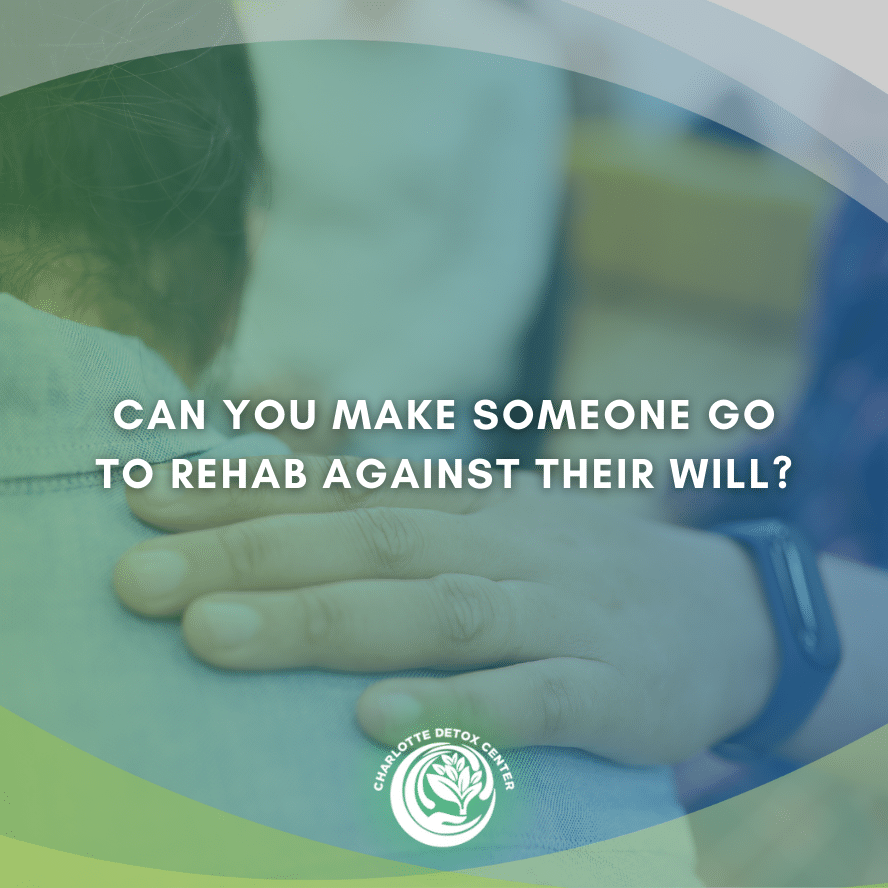Can You Make Someone Go To Rehab Against Their Will?

Medically Verified: 2/1/24
Medical Reviewer
Chief Editor

All of the information on this page has been reviewed and verified by a certified addiction professional.
Watching someone struggle with drug and alcohol abuse can be incredibly challenging. Whether someone develops a dependence on a prescription drug or abuses illicit substances recreationally, substance abuse has long-lasting consequences on a person’s life and relationships.
Often, an addicted person’s loved ones may feel guilt, shame, anger, or anxiety and want to help them get the help they need to overcome their substance abuse. Comprehensive treatment can help people address the complex, underlying aspects of their substance abuse and learn the skills to stay sober for life.
But can you force someone to go to rehab if they don’t want to? This guide will outline the steps you can take to convince an addicted loved one to go to rehab. Reach out to the Charlotte North Carolina Detox specialists today to learn more about our supportive detox programs or to find treatment for any stage of your recovery.
Recognizing Substance Abuse and Addiction
Drug and alcohol abuse can change a person’s appearance, behavior, and mood. Recognizing the signs of substance abuse can help you seek treatment sooner.
Here are some common signs of substance abuse.
Behavioral signs of substance abuse
You may notice changes in a person’s behaviors or habits, including:
- Mood swings or changes in personality
- Aggressive, irritable, or hostile behaviors
- Depression
- Apathy or lethargy
- Changes in social media use
- Sudden loss of interest in old relationships and hobbies
- New friend group
- Criminal activities
- Dishonesty or being sneaky
- Drinking or using drugs more often or in greater amounts
Physical signs of substance abuse
People may have significant changes in their appearance that suggest substance abuse, including:
- Being disheveled
- Poor hygiene
- Glazed or bloodshot eyes
- Constricted or dilated pupils
- Too much or too little sleep
- Significant weight gain or loss in a short period
- Body odor
- Marks, scabs, or bruises on the body
- Exhibiting withdrawal symptoms–shaking, sweating, nausea, body aches, etc.–when not using drugs or alcohol
Remember that anyone can develop substance abuse or addiction, even without known risk factors.
Can You Make Someone Go to Rehab?
If you notice that someone you love exhibits signs of substance abuse or you learn about their drug and alcohol use in other ways, you will likely want to help them find treatment as quickly as possible.
But what if you offer to help your loved one find help, and they refuse to go? Is it possible to make someone get addiction treatment?
The short answer is: it depends. It can be very tricky–and often impossible–to force someone to seek treatment for addiction against their will. In some states, you can go through a lengthy legal process to force someone into substance abuse treatment programs. The process is challenging. In states where it is possible to seek court-mandated drug rehab, you may follow these steps:
- Fill out a form to declare why your loved one requires substance abuse treatment.
- A judge will review the form and issue a hearing if appropriate.
- If a hearing is issued, you will present in court to explain why your loved one requires treatment.
- The addicted person will have the chance to present information for consideration.
- If the judge declares that treatment is necessary, your loved one will be taken into custody and held for treatment.
The process for mandating substance abuse treatment is lengthy and complex. Instead of pursuing a legal course of action, you may consider using an intervention to convince your addicted loved one to seek treatment.
How to Convince Someone to Go to Rehab
An intervention is a planned conversation between an addicted person, a professional interventionist, and a group of concerned friends and family members. During an intervention, people describe how the addicted person’s substance abuse has affected them. The group allows the addicted person to begin treatment and then helps them transition into rehab immediately if they accept help. If the person does not accept help, the group outlines what consequences will occur.
Planning an effective intervention requires planning, practice, and support. Hiring a professional interventionist will help you effectively organize the intervention, hold it, and process what happened afterward. An interventionist can connect you to community resources to help you, your family, and your loved one recover together.
What Can You Do if Someone Refuses to Go to Rehab?
If you live in a state that doesn’t allow court-ordered rehab, or you don’t want to go through this process, you can take steps to encourage your loved one to seek treatment on their own.
In addition to planning an intervention, here are some things you can do to help your loved one recognize that they need substance abuse treatment:
- Learn as much as you can about addiction, rehab, and recovery. The more you know, the better you’ll be at supporting your addicted loved one.
- Find your own support. Helping an addicted person is challenging, and you must have a safe place to process your feelings and seek accurate information. Seek support groups or individual counseling.
- Work with a counselor or addiction specialist to identify and stop enabling behaviors.
When you understand addiction as a disease, you can work more effectively to support an addicted loved one. Find the help you need to keep offering love and support–and don’t lose hope that your loved one can get better.
Get Help Now
You don’t have to carry the weight of drug and alcohol abuse alone. Comprehensive, caring treatment is just a phone call away. Reach out to the team at Charlotte North Carolina Detox now to find support or treatment for any stage of addiction recovery.
